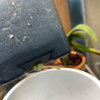Rosa fedtschenkoana
medaryville
14 years ago
I found a very old posting on another forum regarding a species rose (Rosa fedtschenkoana). Apparently it is fragrant, tetraploid, reblooming, and extremely hardy. However, I have been unable to find much more information on it. With all of that, I am surprised it has not been used more in breeding. Perhaps there was some misinformation in the posting.

roseseek
Related Professionals
Cary Landscape Architects & Landscape Designers · Manhattan Beach Landscape Architects & Landscape Designers · Salem Landscape Architects & Landscape Designers · Edmond Landscape Contractors · Andover Landscape Contractors · Canby Landscape Contractors · Indio Landscape Contractors · Kailua Landscape Contractors · Lehigh Acres Landscape Contractors · Middletown Landscape Contractors · New Cassel Landscape Contractors · North Lauderdale Landscape Contractors · Selden Landscape Contractors · West Palm Beach Landscape Contractors · Anderson Roofing & Gutters